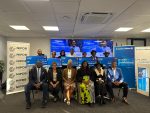Namibia’s mining industry has invested a substantial N$1.781 billion in skills development over the past decade, a cornerstone commitment highlighted by President Dr. Netumbo Nandi-Ndaitwah as critical to the nation’s inclusive economic future. This massive investment, revealed during the President’s keynote address opening the 2025 Chamber of Mines Mining Expo and Conference in Windhoek, underscores the sector’s role beyond resource extraction, positioning it as a vital partner in building national human capital.
Speaking to a packed audience last week at the Windhoek Showgrounds, President Nandi-Ndaitwah lauded the industry’s dual focus: driving robust economic performance while simultaneously empowering Namibians through skills and employment. “Beyond employment, mining companies are also investing heavily in internal training programmes, ensuring that employees are continuously upskilled to meet evolving industry demands,” the President stated. She further emphasized structured internship and graduate development programmes run by many companies, providing “young Namibians with practical experience, mentorship, and pathways into long-term careers.”
This N$1.8 billion skills investment forms a crucial pillar of the sector’s broader socio-economic contribution, which extends far beyond direct mining operations. The President detailed how these programmes are “laying the foundation for a more inclusive, knowledge-driven economy,” reflecting the industry’s evolution “not just as an economic engine, but as a partner in national development.” The impact is tangible: in 2024 alone, the sector created 9,437 permanent jobs, with an impressive 97% filled by Namibian citizens, demonstrating a clear commitment to local capacity building.
The skills development investment complements a further N$1.715 billion collectively spent by mining firms on Corporate Social Responsibility (CSR) initiatives over the same ten-year period. These funds have supported critical community infrastructure development, including healthcare facilities, schools, water and energy systems, food security programmes, and local economic diversification projects in host communities nationwide. President Nandi-Ndaitwah stressed that these contributions represent “long-term, strategic investments in the well-being and resilience of our people,” creating lasting opportunities beyond mine boundaries.
This focus on human capital comes amidst a period of significant resilience and growth for the mining sector, which President Nandi-Ndaitwah described as the “bedrock of the Namibian economy.” Despite global headwinds leading to a sectoral contraction of 1.2% in 2024, mining generated N$52.3 billion in revenue, contributed 13.3% to GDP, and created over 2,600 new jobs. Total direct employment reached 20,843 – a 14.6% year-on-year increase.
Crucially, the sector is becoming a powerful engine for broader local economic participation. Mining companies spent N$23.94 billion on goods and services procured from Namibian businesses in 2024, representing 46.2% of the industry’s total revenue and 62% of its total procurement. This high level of local spending, averaging between 60% and 80% industry-wide, acts as a “powerful driver of inclusive economic growth, supporting thousands of Namibian-owned enterprises across the country.” The sector also contributed N$5.62 billion to the national fiscus through taxes, royalties, and levies.
President Nandi-Ndaitwah challenged Namibians and institutions to seize the opportunities this vibrant sector presents. She pointed to the National Database of Mining Goods and Services, launched at last year’s Expo, as a key tool for entrepreneurs to “identify and access commercial opportunities within the sector.” Urging Namibians to move beyond just employment, she called for active participation as “beneficiaries and business owners in our mining economy.” To support this, she appealed to government ministries, financial institutions, development banks, educational institutions, and development partners to provide necessary support, including finance, technical assistance, and capacity-building. “Deepening local participation in the mining supply chain,” she argued, “is one of the most effective ways to ensure that the benefits of our mineral wealth are shared broadly.”
The future outlook remains promising, underpinned by strong investor confidence. Chamber of Mines members increased exploration expenditure by a remarkable 38.1% in 2024, totalling a record N$1.23 billion – the highest since independence. The uranium sector, where Namibia ranks as the world’s third-largest producer, is experiencing significant revitalization. The recommissioning of the Langer Heinrich Uranium Mine and accelerated developments at the Tumas and Etango projects signal a “new era of growth,” capitalizing on the global shift towards nuclear power as a carbon-neutral energy source. Similarly, the anticipated development of Namibia’s third gold mine promises further diversification.
However, the President emphasized the urgent need to finalize the long-awaited Minerals Bill to sustain this momentum and maintain competitiveness. This legislation is critical to modernize Namibia’s mining framework, making it “more transparent, predictable, and fit for purpose.” It will enhance investment attractiveness by clarifying licensing, ownership structures, and regulations, while aligning Namibia with global standards on environmental stewardship, social accountability, and responsible resource governance. “Its timely enactment,” President Nandi-Ndaitwah asserted, “will send a strong signal that Namibia is ready to lead in building a modern and inclusive mining sector.”
In declaring the expanded three-day Expo officially open, the President concluded that Namibia’s mining sector is “not only thriving, it is evolving into a more inclusive, innovative, and forward-looking industry.” With its strong performance, expanding exploration, and growing global relevance, the sector is positioned as a key driver for the implementation of Namibia’s Sixth National Development Plan (NDP6). The N$1.8 billion investment in skills over the past decade stands as a powerful testament to the industry’s commitment to ensuring that the wealth beneath Namibia’s soil translates into enduring capability and opportunity for its people above.










